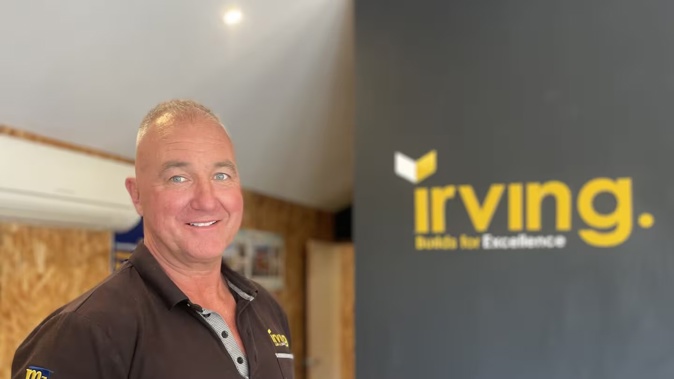
- Data from Centrix showed 728 construction companies went into liquidation in the year to March.
- There are high rates of depression and suicide among the construction workforce
- Builder Lance Irving considered collapsing his business due to the financial stress he faced in the construction sector.
- Builder’s advocate Marti Amos says financial literacy should be part of apprenticeships.
Builder Lance Irving came close to closing his business down because of financial pressures he faced in the construction sector - and fortunately reached out for support.
“How close did I come to ending it? I was very, very fortunate to have some good people around me” Irving told the Herald.
“I picked up the phone and started communicating with people flat out and realised ... there was a way forward for me that didn’t mean folding up. I came pretty close.”
Irving says most people don’t realise the full commitment and sense of responsibility involved in running a business.
“I think some people just cannot handle the pressure of owing people a lot of money, they go to ground and don’t talk.
“Luckily for me, I was big enough to pick up the phone and ask people and talk to people about what I was dealing with.
Irving now sees himself as one of the lucky ones, in an industry famous for being unforgiving.
Construction crisis
New Zealand’s construction sector has high suicide rates - and Māori, Pasifika, women, migrants, apprentices and labourers are among those at highest risk.
In 2023, 80 construction workers - up from 38 in 2019, 61 in 2020, 77 on 2021 - lost their lives to suspected suicide, and 1628 required time off because of self-harming incidents.
Organisations such as Mates are working in the industry to reduce those statistics.
The latest construction data reflects the tough grind the industry is going through. Data from Centrix showed 728 construction companies went into liquidation in the year to March.
Calls for an overhaul
Builder Marti Amos says half the problems facing builders could be avoided if they had basic financial literacy as part of their training.
“We need reform to address the mental health crisis in New Zealand’s construction industry,” Amos (Ngāpuhi) told the Herald.
“Builders are some of our hardest-working people yet they’re under immense pressure and many are grappling with cashflow issues, long hours, and increasing stress.
“Kiwi builders have been taught how to create outstanding projects, they’re brilliant with the tools – but no one has taught them how to build a great business.
“When you’re constantly worrying about how to pay your subcontractors or secure payroll for the next week, it isn’t just your business that suffers – it’s your whole life,” he says.
“We need to integrate business management training into apprenticeship programmes for those who aspire to run their own businesses. The gap in business and financial skills is a major driver of the mental health crisis because it leads to stress, poor decision-making, and financial instability,” Amos said.
Amos was instrumental in helping Irving turn his business around.

Maori Master Builder Marti Amos, May 2025. Image Supplied
The politics of change
Building and Construction Minister Chris Penk told the Herald that a stronger, better economy will help builders.
“The Government is working to create the right conditions for the sector to thrive. Changes like reforming the building consent system might sound technical, but they will have a real human impact by lowering costs and giving the industry a more reliable pipeline of work,” Penk said.
“We also know how much of a difference targeted mental health support can make in someone’s life. That’s why, in December, the Government invested in MATES in Construction through the Mental Health and Addiction Community Sector Innovation Fund. The organisation offers on-site training, case management and helps connect workers with professional support.

Prime Minister Christopher Luxon and Building and Construction Minister Chris Penk.
“When financial stress eases, it becomes easier for people to focus on their work, their families and their own health and wellbeing.”
Penny Simmonds, Minister for Vocational Education, told the Herald from 2026 the building and construction industries would see changes including:
- New Industry Skills Boards (ISBs) will be set up to set training standards, develop qualifications, endorse programmes and moderate assessments.
- Apprentices and trainees will move with their work-based learning units to the ISBs for up to two years.
- New students will enrol directly with new work-based learning private providers, polytechnics, or Wānanga as they become available.
- ISBs will be able to enrol new learners until other providers are set up to deliver work-based learning.
“The Government is committed to ensuring that mental health and wellbeing are part of a successful apprenticeship,” Simmonds said.
Minister for Vocational Education Penny Simmonds.
“Put simply, we are transforming work-based learning by putting apprentices and trainees front and centre at the heart of the system and placing industry and employers back in the driver’s seat, encouraging them to play a hands-on role in shaping training, making sure it’s flexible and aligned with regional needs.”
Amos has authored a book, The Profitable Builders Playbook, to help equip builders with the business acumen they need.
“At the moment they’re stuck on the builder’s ‘hamster wheel’, caught in the weeds of daily operations without the skills to manage the large sums of money and complex challenges that come with running a construction company.
“What we need is to implement business training into apprenticeship programmes to ensure that our future generations of builders are as adept at managing large-scale financial responsibilities as they are at delivering quality craftsmanship.”
Joseph Los’e is an award winning journalist and joined NZME in 2022 as Kaupapa Māori Editor. Los’e was a chief reporter, news director at the Sunday News newspaper covering crime, justice and sport. He was also editor of the NZ Truth and, prior to joining NZME, worked at urban Māori organisation Whānau Waipareira.
Take your Radio, Podcasts and Music with you









